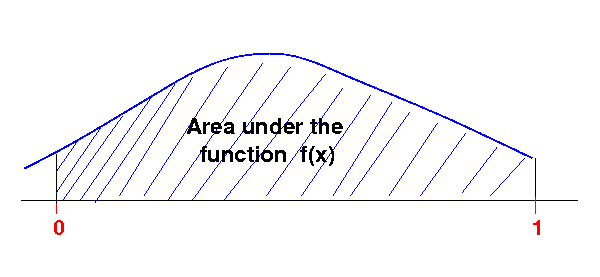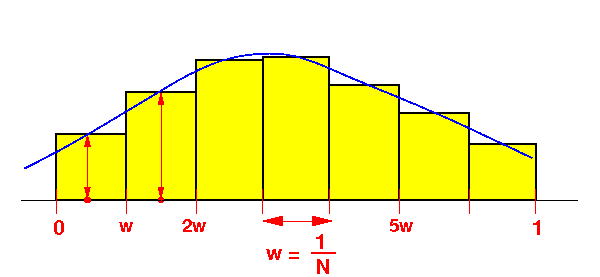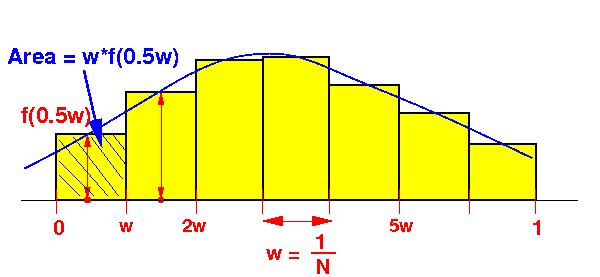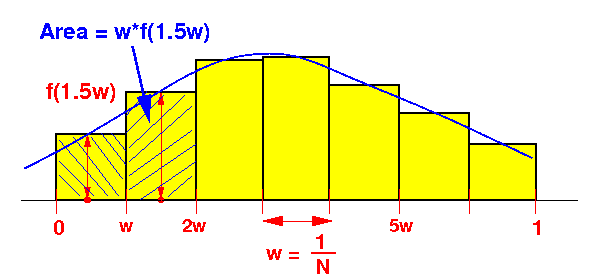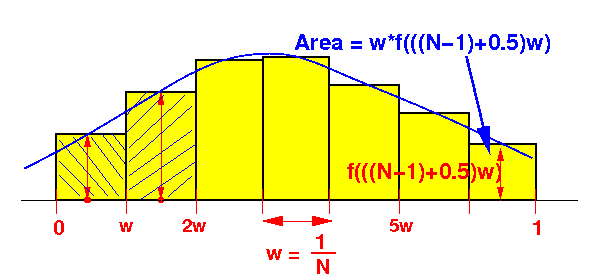Computing π with
numerical integration
- One of the
many ways to
compute the
value of
π is:
1
π = ∫ (2.0/sqrt(1 - x*x)) dx
0
|
- You can
prove this
equality by
compute the
integral using
Matlab as follows:
>> syms x
>> int( 2/sqrt(1-x*x), 0, 1 )
ans = pi
|
- We will use this
integral to
compute an
approximation for
π using:
|
DEMO:
matlab -nodesktop
Approximating π
using the Rectangle Rule
- The Rectangle Rule
algorithm in
C used to
approximate
π:
double f(double x)
{
return( 2.0 / sqrt(1 - x*x) ); // Used to approximate pi
}
int main(int argc, char *argv[])
{
int i;
int N;
double sum;
double x, w;
N = ...; // N will determine the accuracy of the approximation
w = 1.0/N; // a = 0, b = 1, so: (b-a) = 1.0
sum = 0.0;
for (i = 0; i < N; i++)
{
x = (i + 0.5) * w;
sum = sum + w*f(x);
}
printf("Pi = %lf", sum);
}
|
|
DEMO:
demo/pthread/compute-pi.c
Common technique to
parallelize program with
multi-threaded program
-
How to
parallelize a
single-threaded
program:
- Consider
program segments
where
work can be
performed
concurrently
|
-
Good place to
look:
- Example of a
loop that can be
parallelized:
for (i = 0; i < N; i = i + 1)
{
x = w*(i + 0.5);
sum = sum + w*f(x);
}
Loop computes:
w*f(0.5w) + w*f(1.5w) + w*f(2.5w) + ... + w*f( (N-1)+0.5)*w )
|
|
Parallelizing
loops with
multi-threaded programming
- Example of a
loop that can be
parallelized with
multi-threaded programming:
for (i = 0; i < N; i = i + 1)
{
x = w*(i + 0.5);
sum = sum + w*f(x);
}
Loop computes:
w*f(0.5w) + w*f(1.5w) + w*f(2.5w) + ... + w*f( (N-1)+0.5)*w )
|
-
Traditional
work load
distribution between
2 threads:
values added by thread 0 values added by thread 1
|<----------------------------->|<----------------------------->|
Thread 0 computes: w*f(0.5w) + w*f(1.5w) + .... w*f(0.5-0.5w)
Thread 1 computes: w*f(0.5+0.5w) + w*f(0.5+1.5w) + ... + w*f(1.0+0.5w)
|
|
Parallelizing
loops with
multi-threaded programming
- Example of a
loop that can be
parallelized with
multi-threaded programming:
for (i = 0; i < N; i = i + 1)
{
x = w*(i + 0.5);
sum = sum + w*f(x);
}
Loop computes:
w*f(0.5w) + w*f(1.5w) + w*f(2.5w) + ... + w*f( (N-1)+0.5)*w )
|
-
Alternate way to
distribute the
work load
between
2 threads
(
easier to
code):
values added by thread 0
| | | | | | | | | | | | | |
V V V V V V V V V V V V V V
|-|-|-|-|-|-|-|-|-|-|-|-|-|-|-|-|-|-|-|-|-|-|-|-|-|-|-|
^ ^ ^ ^ ^ ^ ^ ^ ^ ^ ^ ^ ^ ^
| | | | | | | | | | | | | |
values added by thread 1
Thread 0 computes: w*f( (0+0.5)w ) + w*f( (2+0.5)w ) + ....
Thread 1 computes: w*f( (1+0.5)w ) + w*f( (3+0.5)w ) + ....
|
|
Comment:
paging and
multi-threaded programming
- Multi-threaded
program that
scans
of
memory data
can
be
affected by
paging
Example:
values accessed by thread 0
| | | | | | | | | | | | | |
V V V V V V V V V V V V V V
|-|-|-|-|-|-|-|-|-|-|-|-|-|-|-|-|-|-|-|-|-|-|-|-|-|-|-|
^ ^ ^ ^ ^ ^ ^ ^ ^ ^ ^ ^ ^ ^
| | | | | | | | | | | | | |
values accessed by thread 1
Thread 0 accesses: a[0] a[2] ... // Access memory variables
Thread 1 accesses: a[1] a[3] ... // Access memory variables
|
-
However:
computation
that
do not access
memory is
not affected by
paging:
Thread 0 computes: w*f( (0+0.5)w ) + w*f( (2+0.5)w ) + ....
Thread 1 computes: w*f( (1+0.5)w ) + w*f( (3+0.5)w ) + ....
|
|
Multi-threaded program
to compute the approximation π
using the Rectangle Rule
-
Recall
the single-threaded
program in
C to
approximate
π:
int main(int argc, char *argv[])
{
int i;
int N; // <----- Share this variable
double sum; // <----- Share this variable
double x, w;
N = ...; // N will determine the accuracy of the approximation
w = 1.0/N; // a = 0, b = 1, so: (b-a) = 1.0
sum = 0.0;
for (i = 0; i < N; i++)
{
x = (i + 0.5) * w;
sum = sum + w*f(x);
}
}
|
|
Multi-threaded program
to compute the approximation π
using the Rectangle Rule
- We must
make
N and
sum
shared variables
because they are used by
all
threads:
int N; // # intervalues Shared variables
double sum; // Sum of rectangles
int main(int argc, char *argv[])
{
N = ...; // N will determine the accuracy of the approximation
sum = 0.0;
Create threads to do the work...
Wait for threads to finish...
}
|
|
Multi-threaded program
to compute the approximation π
using the Rectangle Rule
- Create
num_threads
threads to
do the work:
int N; // # intervalues Shared variables
double sum; // Sum of rectangles
int num_threads; // # Threads used
int main(int argc, char *argv[])
{
N = ...; // N will determine the accuracy of the approximation
sum = 0.0;
num_threads = ...; // # threads used
pthread_t tid[100]; // Used for pthread_join()
int id[100]; // Start index values for each thread
for (int i = 0; i < num_threads; i++)
{
id[i] = i;
pthread_create(&tid[i], NULL, PIworker, &id[i]);
}
}
|
|
Multi-threaded program
to compute the approximation π
using the Rectangle Rule
- Wait for
all threads to
complete:
int N; // # intervalues Shared variables
double sum; // Sum of rectangles
int num_threads; // # Threads used
int main(int argc, char *argv[])
{
N = ...; // N will determine the accuracy of the approximation
sum = 0.0;
num_threads = ...; // # threads used
pthread_t tid[100]; // Used for pthread_join()
int id[100]; // Start index values for each thread
for (int i = 0; i < num_threads; i++)
{
id[i] = i;
pthread_create(&tid[i], NULL, PIworker, &id[i]);
}
for (int i = 0; i < num_threads; i = i + 1) // Wait for threads
pthread_join(tid[i], NULL);
}
|
|
The PIworker( )
function
- The PIworker(id)
function will
compute a
part of the
total sum that
starts at
index id:
int N; // # intervalues Shared variables
double sum; // Sum of rectangles
int num_threads; // # Threads used
void *PIworker(int *id)
{
int i, myStart;
double x;
double w = 1.0/N;
myStart = *id;
Computes:
for (i = myStart; i < N; i = i + num_threads)
{
x = w * ((double) i + 0.5); // next x
sum = sum + w*f(x); // Add to sum
}
}
|
|
The PIworker( )
function
- The PIworker(id)
function will
compute a
part of the
total sum that
starts at
index id:
int N; // # intervalues Shared variables
double sum; // Sum of rectangles
int num_threads; // # Threads used
void *PIworker(int *id)
{
int i, myStart;
double x;
double w = 1.0/N;
/*** Get the parameter (which is my starting index) ***/
myStart = *id;
/*** Compute sum, skipping every "num_threads" items ***/
for (i = myStart; i < N; i = i + num_threads)
{
x = w * ((double) i + 0.5); // next x
sum = sum + w*f(x); // Add to sum
}
pthread_exit(NULL);
}
|
|
DEMO:
demo/pthread/compute-pi-mt0.c ---
Synchronization error...
Synchronizing the
updates in
the PIworker( )
function
- We must use a
mutex variable
to
synchronize the
updates to
the shared variable
sum:
int N; // # intervalues Shared variables
double sum; // Sum of rectangles
int num_threads; // # Threads used
pthread_mutex_t sum_mutex;
void *PIworker(int *id)
{
int i, myStart;
double x;
double w = 1.0/N;
/*** Get the parameter (which is my starting index) ***/
myStart = *id;
/*** Compute sum, skipping every "num_threads" items ***/
for (i = myStart; i < N; i = i + num_threads)
{
x = w * ((double) i + 0.5); // next x
pthread_mutex_lock(&sum_mutex);
sum = sum + w*f(x); // Add to sum
pthread_mutex_unlock(&sum_mutex);
}
pthread_exit(NULL);
}
|
|
Synchronizing the
updates in
the PIworker( )
function
- We must
initialize
the
mutex variable
in
main( )
before
creating the
threads:
pthread_mutex_t sum_mutex;
int main(int argc, char *argv[])
{
N = ...; // N will determine the accuracy of the approximation
w = 1.0/N; // a = 0, b = 1, so: (b-a) = 1.0
sum = 0.0;
pthread_mutex_int(&sum_mutex, NULL);
num_threads = ...; // # threads used
pthread_t tid[100]; // Used for pthread_join()
int id[100]; // Start index values for each thread
for (i = 0; i < num_threads; i++)
{
id[i] = i;
pthread_create(&tid[i], NULL, PIworker, &id[i]);
}
for (i = 0; i < num_threads; i = i + 1) // Wait for threads
pthread_join(tid[i], NULL);
}
|
|
DEMO:
demo/pthread/compute-pi-mt1.c ---
Synchronization
bottleneck...
Synchronization Bottleneck
Avoiding synchronized
updates
-
Synchronization
is
required to
update
shared variable:
int N, num_threads;
double sum; // <---- Shared variable
pthread_mutex_t sum_mutex;
void *PIworker(int *id)
{
int i, myStart;
double x;
double w = 1.0/N;
/*** Get the parameter (which is my starting index) ***/
myStart = *id;
/*** Compute sum, skipping every "num_threads" items ***/
for (i = myStart; i < N; i = i + num_threads)
{
x = w * ((double) i + 0.5); // next x
pthread_mutex_lock(&sum_mutex);
sum = sum + w*f(x); // Synchronize access to shared var
pthread_mutex_unlock(&sum_mutex);
}
pthread_exit(NULL);
}
|
|
Avoiding synchronized
updates
- Use a
local variable
to
avoid
synchronization:
int N, num_threads;
double sum; // <---- Shared variable
pthread_mutex_t sum_mutex;
void *PIworker(int *id)
{
int i, myStart;
double x;
double w = 1.0/N;
/*** Get the parameter (which is my starting index) ***/
myStart = *id;
int mySum = 0.0; // <---- Not shared
for (i = myStart; i < N; i = i + num_threads)
{
x = w * ((double) i + 0.5); // next x
mySum = mySum + w*f(x); // Use local var to avoid synchr
}
pthread_exit(NULL);
}
|
|
Avoiding synchronized
updates
-
Add the
final total using a
synchronized
update:
int N, num_threads;
double sum; // <---- Shared variable
pthread_mutex_t sum_mutex;
void *PIworker(int *id)
{
int i, myStart;
double x;
double w = 1.0/N;
/*** Get the parameter (which is my starting index) ***/
myStart = *id;
int mySum = 0.0; // <---- Not shared
for (i = myStart; i < N; i = i + num_threads)
{
x = w * ((double) i + 0.5); // next x
mySum = mySum + w*f(x); // Use local var to avoid synchr
}
pthread_mutex_lock(&sum_mutex);
sum = sum + mySum; // Synchronize access to shared var
pthread_mutex_unlock(&sum_mutex);
pthread_exit(NULL);
}
|
|
DEMO:
demo/pthread/compute-pi-mt2.c
❮
❯
